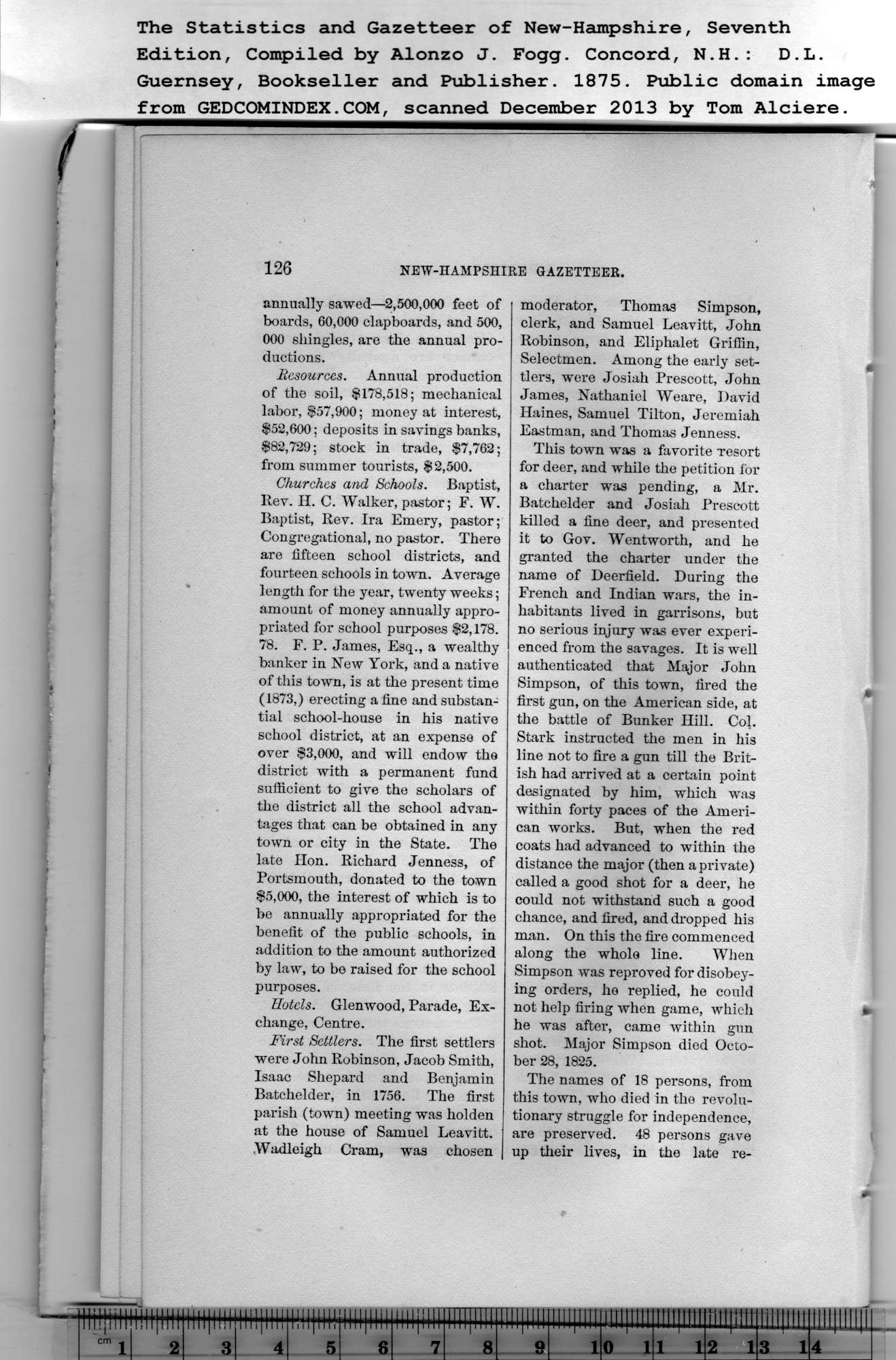|
126
The Statistics and Gazetteer of New-Hampshire, Seventh
Edition, Compiled by Alonzo J. Fogg. Concord, N.H.: D.L.
annually sawed—2,500,000 feet of
boards, 60,000 clapboards, and 500,
000 shingles, are the annual pro-
ductions.
Resources. Annual production
of the soil, $178,518; mechanical
labor, $57,900; money at interest,
$52,600; deposits in savings banks,
$82,729; stock in trade, $7,762;
from summer tourists, $2,500.
Churches and Schools. Baptist,
Rev. H. C. Walker, pastor; F. W.
Baptist, Rev. Ira Emery, pastor;
Congregational, no pastor. There
are fifteen school districts, and
fourteen schools in town. Average
length for the year, twenty weeks;
amount of money annually appro-
priated for school purposes $2,178.
78. F. P. James, Esq., a wealthy
banker in New York, and a native
of this town, is at the present time
(1873,) erecting a fine and substan-
tial school-house in his native
school district, at an expense of
over $3,000, and will endow the
district with a permanent fund
sufficient to give the scholars of
the district all the school advan-
tages that can be obtained in any
town or city in the State. The
late Hon. Richard Jenness, of
Portsmouth, donated to the town
$5,000, the interest of which is to
be annually appropriated for the
benefit of the public schools, in
addition to the amount authorized
by law, to be raised for the school
purposes.
Hotels. Glenwood, Parade, Ex-
change, Centre. |
First Settlers. The first settlers
were John Robinson, Jacob Smith,
Isaac Shepard and Benjamin
Batehelder, in 1756. The first
parish (town) meeting was holden
at the house of Samuel Leavitt.
Wadleigh Cram, was chosen
moderator, Thomas Simpson,
clerk, and Samuel Leavitt, John
Robinson, and Eliphalet Griffin,
Selectmen. Among the early set-
tlers, were Josiah Prescott, John
James, Nathaniel Weare, David
Haines, Samuel Tilton, Jeremiah
Eastman, and Thomas Jenness.
This town was a favorite resort
for deer, and while the petition for
a charter was pending, a Mr.
Batehelder and Josiah Prescott
killed a fine deer, and presented
it to Gov. Wentworth, and he
granted the charter under the
name of Deerfield. During the
French and Indian wars, the in-
habitants lived in garrisons, but
no serious injury was ever experi-
enced from the savages. It is well
authenticated that Major John
Simpson, of this town, fired the
first gun, on the American side, at
the battle of Bunker Hill. Col.
Stark instructed the men in his
line not to fire a gun till the Brit-
ish had arrived at a certain point
designated by him, which was
within forty paces of the Ameri-
can works. But, when the red
coats had advanced to within the
distance the major (then a private)
called a good shot for a deer, he
could not withstand such a good
chance, and fired, and dropped his
man. On this the fire commenced
along the whole line. When
Simpson was reproved for disobey-
ing orders, he replied, he could
not help firing when game, which
he was after, came within gun
shot. Major Simpson died Octo-
ber 28, 1825.
The names of 18 persons, from
this town, who died in the revolu-
tionary struggle for independence,
are preserved. 48 persons gave
up their lives, in the late re- |
